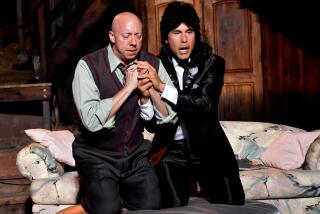FOR GOTANDA, A DESTINY IN AMERICA
“It’s one of those cliche lines you find in an old World War II movie,” said Philip Kan Gotanda, “where the Japanese soldier snarls (in stagy Hollywood/Oriental accent), ‘Yankee dawg, you die!’ ”
It’s also the title of Gotanda’s newest play--an homage to both the world of entertainment and the Asian-American experience, opening as a “work-in-progress” Sunday at East West Players. (Why a staged reading? “I wanted to see the play on its feet, the arc of the piece. That’s exciting. The actors could’ve spent their time memorizing lines, but what you give up is the chance to really work on characterizations and relationships.”)
“Yankee Dawg You Die,” he said, centers on “an older Asian-American actor, an ex-hoofer on the mini-chop suey circuit (akin to the blacks’ chittlin’ circuit) in the ‘30s and ‘40s--scuffling, dreaming about being a great dancer like Fred Astaire. Now he’s in his 60s and takes any role he can get.
“Then there’s a young actor: mid-20s, very political. He won’t put up with playing demeaning, stereotypic roles because he has integrity . . . . So it’s about these two people: how they meet, fight, and eventually come to recognize themselves in each other.”
For the San Francisco-based playwright, 36, those human connections--within the context of a particular “cultural specificity”--are the foundation of his work.
“I think most writers write from the truth of their own experience,” he said. “And when I was growing up, running around the house, my mother and father had yellow faces. We ate rice with hot dogs. I spoke English at home, but my parents would occasionally speak Japanese. My household, extended family, the concerns I grew up with--all dealt with this culture called Japanese-American.”
In 1970, while at UC Santa Cruz (juggling interests in psychiatry and art and confused by the growing social turbulence around him), Gotanda opted for an exchange program to Japan.
“Immediately, I fell in love with pottery,” he said. “I walked off the plane, left the program and went off to a small pottery village, where I spent one of the nicest periods in my life. I think at some point, everyone goes through the quest for ‘Who am I; what are my roots? Am I Japanese? Or American, because I was born and raised there.’
“After 1 1/2 years in Japan, I was wearing Japanese clothes, dreaming in Japanese. I felt very comfortable there.
“Then one day I was walking down the street. I looked up and everything around me was Japanese, everyone had the same face as me. What I felt at that instant was anonymity, something I’d never felt in my 20 years growing up here. It was an amazing feeling. And at that moment, I also knew that I wasn’t Japanese--that for me, destiny was in America.”
He returned and began searching for his way: with a degree in Japanese art, a resumption of his medical studies and later, graduation from law school.
Bit by bit, however, he found his “creative itch” resurfacing, “and I began to write a musical. I’d always written songs (such as “The Ballad of the Issei” on his grandparents), but they were limiting. I saw them in a bigger context: with people talking, bigger staging, costumes, lighting. So while I was working as a legal aide, I wrote a musical (“The Avocado Kid”) and sent it down to East West Players--and they liked it.”
Since then (with the help of several awards and grants), he’s turned out a body of work dealing with the Asian-American consciousness, including the recently completed drama on interracial marriage, “Yohen” (commissioned by the Actors Theater of Louisville); an upcoming “doo-wop” musical (for South Coast Repertory) on the local “car clubs” of the ‘50s, and “The Wash,” which played the Taper’s New Theatre for Now Festival in 1985. (He’s now writing its screenplay for “American Playhouse.”)
“For the past four years I’ve been able to make a living (based on) writing,” he said. “Sometimes you just have to make a decision: ‘I’m going to do it’--and that’s what I did.”
More to Read
The biggest entertainment stories
Get our big stories about Hollywood, film, television, music, arts, culture and more right in your inbox as soon as they publish.
You may occasionally receive promotional content from the Los Angeles Times.










